Of two samples recently introduced by Houde, this is the second and represents a cake that costs a somewhat substantial $175. Chen Zhitong's cakes are seldom inexpensive, whether via Taobao or Houde, and so I tread carefully.
This cake is allegedly a blend of leaves from Laobanzhang and Laoman'e, the neighbouring village. I have enjoyed Laoman'e leaves on many occassions now, and have come to love them. One of my favourites was a 2008 cake from Hailanghao, which, as coincidence would have it, is also a mixture from the same two villages.
Given the promixity of Laoman'e and Laobanzhang, it will come as no surprise to learn that many leaves from the former make their way into the latter, and are sold under the more expensive village's name. There have distinct characteristics, however, which are worthwhile coming to appreciate.
As much as Mr. Chen's business practices come in for criticism, the standard of his cakes is obvious. This particular cake has dark, fairly large leaves, which, in the cool air of an English winter, are quiet while in their dry state - perhaps hibernating.
This reticence disappears at the instant in which water touches leaf: the resulting aroma is a markedly delicious scent of light honey and candy-like sweetness. It sits around the wenxiangbei [aroma cup] for many minutes, and makes the whole room smell similarly pleasant.
You may see the orange soup in the photograph above; the character of the tea is a well-aged blend with a substantial (and very welcome) base of tobacco. Its body is low and strong, reminding me of the better Laoman'e cakes from my past experience. I suspect that this village may account for the majority of the blend, but there is a heavy, dense sweetness that occassionally reminds me of Laobanzhang leaves.
Mr. Chen does indeed know his tea, and the texture here is thick, smooth, and very satisfying.
Testimony to its endurance is the fact that it still takes short brews after twenty infusions, which few cakes can match. Even after all that time, it remains pungent, potent, and charmingly sweet, while never moving far from the rich, tobacco base with which it opened.
Its pricing is, naturally, problematic: is this three times better than the 2009 Yiwu Chawang? I have no doubt that this "Banzhang" cake would bring me much enjoyment, but I cannot pay $175 for it, on principle alone. That said, I highly recommend trying a sample - it would be hard to imagine any fan of potent pu'ercha disliking this solid little cake.

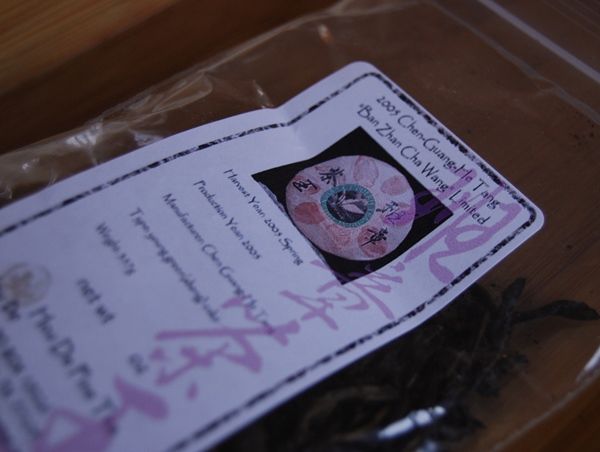
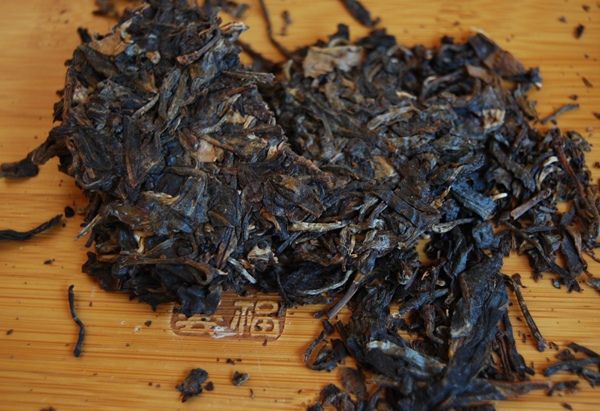
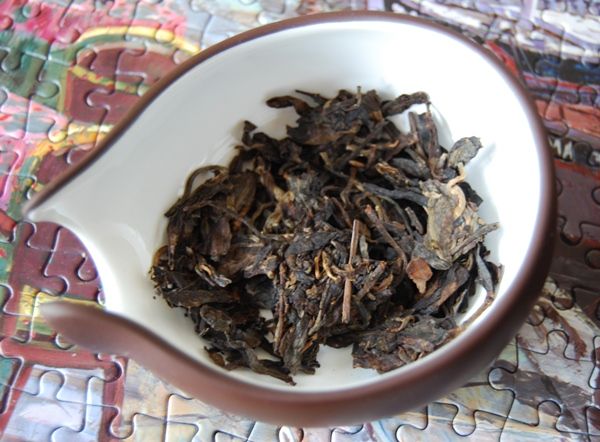
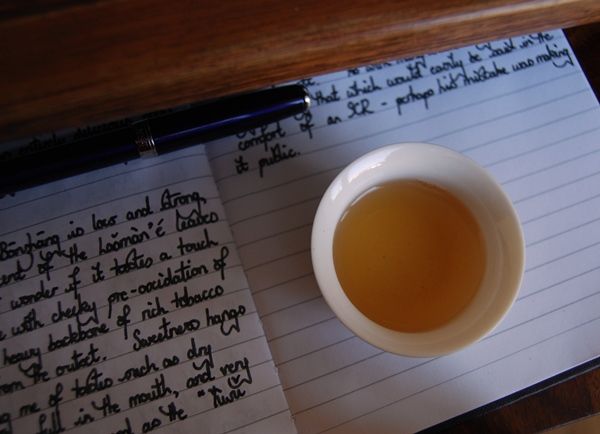
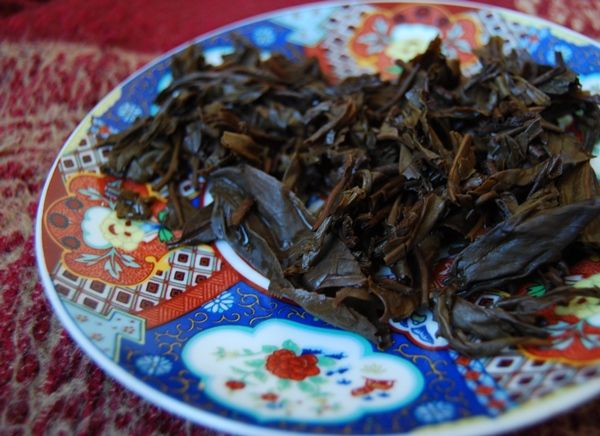
Hobbes,
ReplyDeleteI had a chance to sample the 2008 LBZ/LME you mentioned with Bryan a couple years back (2+ because I was in the old house at the time). It was potent stuff indeed, and I might just have to find a sample of the aforementioned. I find myself in a similar boat when it comes to justifying the cost of many things I enjoy. A friend of mine has recently turned me onto coffee and given a recent experience with Jamaican Blue, it's good...but is it worth it's going price? I can get a cup I like almost as much for a fraction of the cost, and when it boils down to it, I'm still satisfied. I've always believed wholeheartedly that at the end of the day, it's just tea, right? :-)
As always, lovely writing.
best wishes,
jamus
Hi, Jamus,
ReplyDeleteIt's great to hear from you! I've been enjoying your posts on Google+ (I think they're yours!).
It is just tea, you're quite right. I have become a lot less precious about tea over the years, which I think is a good sign. I tend to go overboard when I get into something new; perhaps that's a common story with others. These days, if I miss a cake, it's not the end of the world. "There are plenty more fish in the sea", I tell myself, and go back to drinking something pleasant from years past.
This helps me to avoid paying silly quantities of money for (let's say as an example) unaged "premium" shengpu. I have very rarely bought a cake for more than $100; perhaps the Henglichan from Essence of Tea was the last example that I can remember. It's a matter of principle. It is, after all, "just tea". I'm not likely to be spending $400 on a aged CNNP cake, for example, simply because I find equal (sometimes better) thrills in other cakes.
Everyone finds their own way. For some, I'm sure that buying a rare old cake, and enjoying it slowly, is good fun. I wouldn't like to say that there is a "right" way or a "wrong" way to enjoy tea - simply that which you enjoy the most.
We are perhaps fortunate that pu'ercha has not, on the whole, reached the UK mainstream. Once it does, we might expect prices to look more like those for coffee. As it stands, getting a cake of delicious, unaged, old tree shengpu
from a friendly vendor that they've selected personally for a price under £50 is (to me) the name of the game.
Thanks for getting me thinking!
Toodlepip,
Hobbes
Hello Hobbes,
ReplyDeleteFirst of allow, allow me to thank you for maintaining such an interesting and informative blog. I'm quite new to the world of teas and and this page has been a blessing.
There are 2 questions that I would like to ask. First, would it be possible for you to recommend a nice pu'erh that would serve as a good introduction for someone who doesn't have much experience with this type of tea?
Second, where can I get a leaf holder like the one you have on so many pictures throughout the website? I have a similar yixing gainwan and set of tea cups that I bought from the Dragon Tea House, but they don't have a matching leaf holder like the one you use.
Sincerely,
João Pinheiro
Dear Joao,
ReplyDeleteYou have an exceedingly Portugese name! Let's have a look at your questions:
1. As far as recommendations for new drinkers, there are some lovely examples from a few reliable vendors. A good place to start is Essence of Tea (http://www.essenceoftea.co.uk), where you can buy small samples of anything that you like. Perhaps try something that's a little old, but not too old, to begin with. For example, the 1997 Henglichang "Bulang" is a great tea. (There are some notes of my own on this blog, and thoughts from others elsewhere as a quick Google search will reveal!)
2. The leaf holder is a "cha he" [cha hur, lit. "tea lotus"]. I have a vague memory that Dragon Teahouse sell them; you could also try Yunnan Sourcing, China Chadao, and Red Lantern, which all have good stocks of teaware.
On the subject of teaware, I would start simple - don't buy anything expensive. Add items to your collection slowly, when you're convinced that you need them - otherwise it all grows too quickly, and gets out-of-hand. I write from grim experience. ;)
Let us know how you get on in your adventures! There's much fun to be had in comparing notes with likeminded drinkers.
Toodlepip,
Hobbes
Hello Hobbes,
ReplyDeleteSo I do. In fact, I am Portuguese. :)
Thank you for that recommendation. I was reading your tasting notes and it does sound like a very interesting tea. I'll be sure to buy some! I'd also like to get a larger amount of some less expensive pu erh, something that I could drink frequently to develop a good feel for the taste of pu erh. Can you also recommend something like that?
I did check China Cha Dao and Dragon Tea House (in fact, I bought my gaiwan and cups from them) earlier and they did have cha hes for sale, but none in that particular style — yixing clay on the outside and glazed on the inside. Perhaps I'll contact them and ask if it something they'll have in the future.
As far as teaware goes, I don't have a lot of stuff; currently I have an Adagio tasting cup, a 90ml gaiwan and some cups. I might also get a 50ml gaiwan to try some expensive teas. The world of yixing teapots will have to wait until I'm more familiar with teas and develop a clear preference for certain varieties.
On the subject of gaiwans, how much leaf would you generally use on a 90ml and a 50ml gaiwan?
Thanks,
João
If you're after a cheap-and-cheerful tea to try, by sheer chance my queue of articles has just published this one! Very tasty.
ReplyDeleteGenerally, Douji cakes can be reliable and not expensive, if you're buying from the shops that you listed.
A 50ml gaiwan is very small indeed! With a 90ml gaiwan, I'd probably be using around 10g of leaves, but I brew water-in, water-out, with a 0s infusion time. The answer is, of course, try a few and see how you get on! Start with fewer leaves, and then increase the quantity until you find a balance between increased character and overwhelming power. :)
Toodlepip,
Hobbes
Hello Hobbes,
ReplyDeleteThat tea does look like a good affordable starting point for me. I think I'll go ahead and order a cake as soon as Yunnan Sourcing resumes shipping.
I did consider ordering a small 75g Douji brick from China Cha Dao, but the amount of options got a bit confusing for a pu erh newbie like me. Can you recommend a particular brick? I suspect I'll prefer something on the smoother and sweeter spectrum. :)
Also, do you happen to know if there's an online seller who might have samples of Meghai's 8582 or 7542 from multiple years? It would be really nice to try the same recipe from different years to get an idea of the influence aging might have on a cake.
Thank you for all the help so far! :)
João
Dear Joao,
ReplyDeleteI liked the "Dadou" and "Shengdou" - both were reliable and potent.
In terms of 7542 / 8582 / 7532, I recall that Jas-eTea (or however it's spelled!) has quite a good stock of recent cakes. Essence of Tea has some older examples - you'll probably need to match up samples from a bunch of vendors.
Best of luck,
Hobbes :)
Hello Hobbes,
ReplyDeleteI just tried my first puerh samples and I must say that I'm hooked. I've jumped in the rabbit hole and there's no turning back. :)
The first tea I tried was a shou puerh by Adagio called Pu Erh Poe. I had read some nice things about this tea and had high hopes for it, but unfortunately that was not the case; I found it to be quite vile, not something enjoyable at all. Fortunately, I decided to try my other tea samples (sheng) before giving up on puerh. :)
The other 2 teas I tried were a 2007 Baichatang Ancient Tea Garden (61102 -- quite a strange recipe number or reference) and a 2011 XY Yiwu Xiaguan Zhengshan Old Tree, both from Dragon Tea House.
Having tried these 2 teas, I could definitely understand all the interest in puerh. The 2007 Baichatang was quite light in colour and had a really nice sugary raisin/plum flavour; very fragrant. It also had a certain woody bitterness to it, somewhat akin to a nice wine.
The 2011 Xiaguan was very smoky, with a strong tobacco scent and flavour. It was also quite sweet and less bitter than the Baichatang, which surprised me. I was expecting the 2011 puerh to be noticeably more bitter and lighter in colour, but it was actually the opposite. Is this a characteristic of Xiaguan tea?
I've read quite a bit about puerh recently and I was under the impression that new puerh could be quite hard to appreciate, but it turns out that I really enjoyed it. I can't wait to try some older teas as well!
There's one thing that I find quite hard though; I don't know any chinese and it's a bit difficult for me to find out the actual names of the teas. Some websites have them translated into english while others have everything in chinese. Can you help me with the names of these 2 teas?
2007 Baichatang Ancient Tea Garden - http://www.ebay.co.uk/itm/250418593876#ht_7783wt_993
Would the chinese name for this tea be Gu Chayuan?
2011 Xiaguan XY Yiwu Zhengshan Old Tree - http://www.ebay.co.uk/itm/230724984710
I've found that the first part of the name means "Yiwu Proper Mountain", but what would the correct translation of Old Tree be? Would it be Laoshu?
Thanks for everything,
João
Dear Joao,
ReplyDeleteThanks for the notes! It sounds as if you've found some good cakes, and not ones I've tried. The Baichatang looks especially decent, being a Lincang cake, according to the vendor's page.
You're quite right - "Ancient Tea Garden" is "Guchayuan", which is written over the top of the wrapper: "Yunnan Ancient Teagarden Bingcha". Nice work! Don't forget that Babelcarp is always available if you're getting stuck with the Chinese; you can also use nciku.com to input handwritten Chinese characters (from a wrapper, for example, as in this case).
The Xiaguan wrapper is an allusion to rather a classic cake; I've not seen Xiaguan try to make a "Big Green Tree" before. It is unsurprising to read that you found it to be tobacco-like in character, because modern Xiaguan cakes tend in that direction. It's a "house style" that you either love or hate, I suspect. (I rather like it, but there's only so much of it that you need on your shelves, given how similar they all are.)
The Xiaguan cake's wrapper says "Yiwu Zhengshan Laoshucha" over the top, you're quite right.
I'm glad to read that you're getting on so well!
Toodlepip,
Hobbes
Hello Hobbes,
ReplyDeleteI don't know how these teas compare to other cakes you might have tried, but quite I liked them. In fact, I'm heating up some water for the Baichatang.
I just went ahead and ordered a a bunch of samples from The Essence Of Tea — including the 1997 Henglichang Bulang you recommended — in addition to 2 cakes, a 2011 Essence Of Tea Mansai and a 2008 Menghai 7542.
I checked out Jas eTea and they did have some nice sample packs. Unfortunately, they don't seem to ship items to Portugal. Maybe I'll email them about it when I'm done with the samples I just ordered.
Thanks again for all the help. Those 2 websites are definitely helpful!
João
Dear Joao,
ReplyDeleteThe owner of "Jas eTea" is a nice chap named Steve; I'm sure he'll post to Portugal if asked. There are some decent Xizihao cakes that he still has in stock, I seem to recall, which have since sold out elsewhere.
Toodlepip,
Hobbes